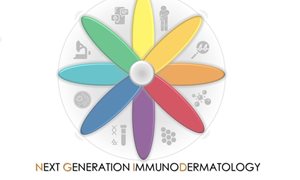20 November 2018
Patrick Zeeuwen
Their previous genetic studies in mice and in vitro biochemical studies using human enzymes and inhibitors have provided information on the role of the human cysteine protease inhibitor cystatin M/E, encoded by the CTS6 gene, in epidermal cornification and maintenance of hair follicle integrity. Recently they have identified a new autosomal-recessive hypotrichosis syndrome caused by a loss-of-function mutation in the CST6 gene. These findings support the importance of protease-antiprotease balance in the regulation of epidermal and hair follicle homeostasis.
This paper is freely available at: link.
 Ellen van den Bogaard (first author), theme Inflammatory diseases, and Patrick Zeeuwen (last author), theme Infectious diseases and global health, report the first family with cystatin M/E deficiency in Genetics in Medicine.
Ellen van den Bogaard (first author), theme Inflammatory diseases, and Patrick Zeeuwen (last author), theme Infectious diseases and global health, report the first family with cystatin M/E deficiency in Genetics in Medicine.
Patrick Zeeuwen
Their previous genetic studies in mice and in vitro biochemical studies using human enzymes and inhibitors have provided information on the role of the human cysteine protease inhibitor cystatin M/E, encoded by the CTS6 gene, in epidermal cornification and maintenance of hair follicle integrity. Recently they have identified a new autosomal-recessive hypotrichosis syndrome caused by a loss-of-function mutation in the CST6 gene. These findings support the importance of protease-antiprotease balance in the regulation of epidermal and hair follicle homeostasis.
This paper is freely available at: link.
-
Want to know more about these subjects? Click on the buttons below for more news.
Related news items

Large NWA ORC grant awarded for national skin research: Next Generation ImmunoDermatology
23 March 2022Research for better treatment methods for chronic skin diseases.
read more
RIMLS awards call for nominations
19 October 2021 RIMLS awards several prizes to stimulate and honor our (young) researchers. Upcoming awards are Supervisor of the Year, Best Master Thesis, Best Publication, Best Image and more. Send your nominations now before 24 November 2021. read more
Best publication award of 2019 in dermatology awarded to Jos Smits and Tom Ederveen
30 September 2020The Dutch Society for Experimental Dermatology (NVED) awarded the publication in Journal of Investigative Dermatology of Jos Smits and Tom Ederveen.
read more
LEO Foundation grant for Ellen van den Bogaard and Patrick Zeeuwen
17 January 2019 LEO Foundation ‘Open competition grants’ are given to support the best dermatology research projects worldwide that improve the understanding of the underlying medicinal, biological, chemical, or pharmacological mechanisms of dermatological diseases and their symptoms. read more

